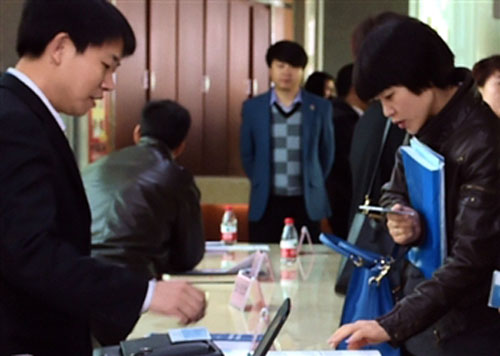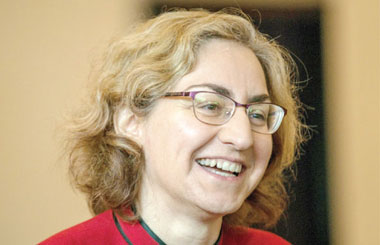Scientific research sales rules to be eased further
Updated: 2016-02-18 07:18
By Zhang Yue(China Daily)
|
|||||||||||
 |
|
The director of the science and technology department of China Petroleum University (left) promotes their newest scientific research achievements. [Photo/epaper.kelamayi.com.cn] |
New policy introduced to encourage more purchases by small and micro-businesses
The central government is to further relax regulations covering the transfer of scientific and technological research achievements from national research institutions to enterprises.
The decision was announced on Wednesday in a statement issued after a State Council executive meeting presided over by Premier Li Keqiang.
Measures will be introduced to encourage such transfers.
First, national research institutes and universities will have the right to sell their research findings to enterprises without national-level approval.
The policy is aimed at encouraging more scientific research achievements to be sold to small and micro-businesses. It calls for special organizations to be set up to supervise these sales.
Second, all profits earned through the sales will go to research producers.
Third, at least 50 percent of such sales will go to researchers, who will eventually be allowed to work with the enterprises that buy their research findings for a maximum of three years. They will retain their positions on research bodies to help the enterprises to better implement research achievements.
The measures are also aimed at accelerating the process of turning scientific and technological achievements into productivity to advance China's innovation-driven strategy and supply-side structural reform.
Bi Yalei, head of the Department of Development at the Shenzhen Institute of Advanced Technology under the Chinese Academy of Sciences, was delighted to hear about the new decision, describing it as a long-awaited relaxation.
He said that for many years financial approval procedures had been a headache when the institute had tried to sell research findings to enterprises because both sides had to wait a long time to obtain government-level approval.
"The approval procedure used to take a very long time, and this delayed the process of turning such research findings into new productivity."
Bi also said that such measures will greatly encourage scientific researchers in their work.
Gao Xudong, deputy director of the Research Center for Technological Innovation at Tsinghua University in Beijing, praised the move to allow researchers to work with enterprises for three years. "Some enterprises who bought scientific research findings could not fully use them due to a lack of understanding of the findings," he said.
Related Stories
Suggestions on Common Sharing of Facilities for Major Nuclear Power Scientific Experiments(Special Issue No 62, 2015) 2016-02-03 16:13
The Sharing Mechanism of US Platform for Scientific Research Instruments and Implications(Special Issue No 61, 2015) 2016-02-03 16:13
TCM scientific innovation alliance formed 2016-01-12 20:39
Yearender 2015: China's top scientific achievements 2015-12-25 07:14
Research center to grow Sino-African scientific ties 2015-12-04 08:17
Today's Top News
Huawei bids to become 'Internet of Things' platform
Britain's Cameron defends EU deal
Sichuan opera proves a hit with UK audiences
WeChat to charge fees for digital wallet transfers
Stocks fall in China after holiday week
Putin, Obama discuss Syrian crisis over phone
Global stock swings not caused by China factors
Russian PM warns against 'new cold war' at MSC
Hot Topics
Lunar probe , China growth forecasts, Emission rules get tougher, China seen through 'colored lens', International board,
Editor's Picks

|

|

|

|

|

|






